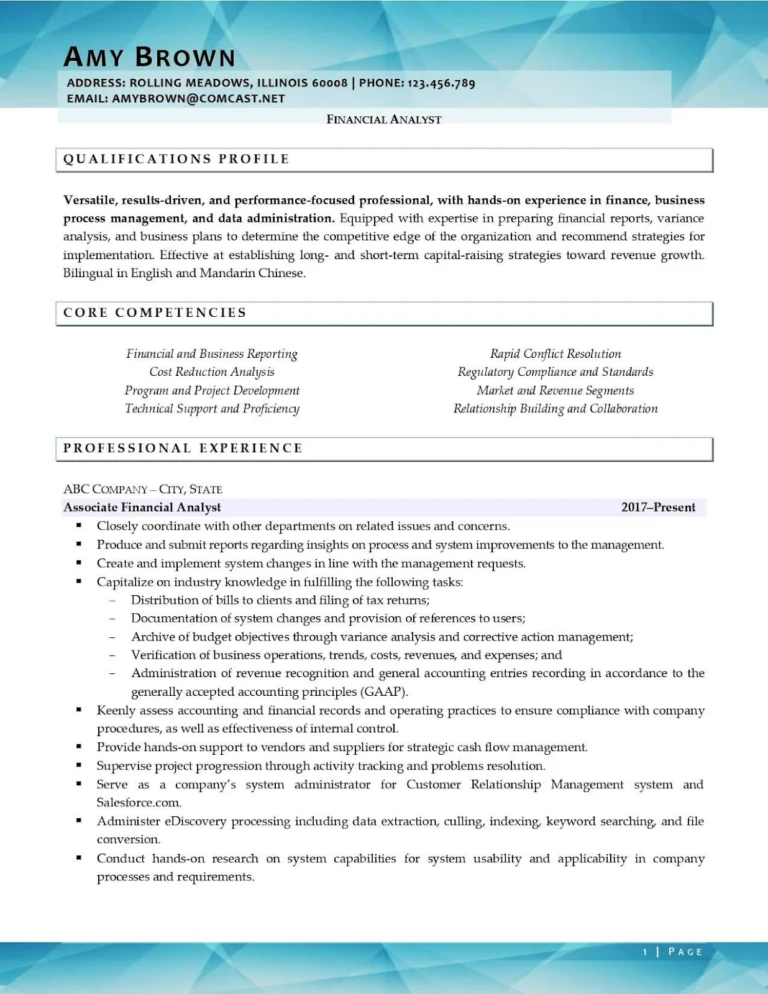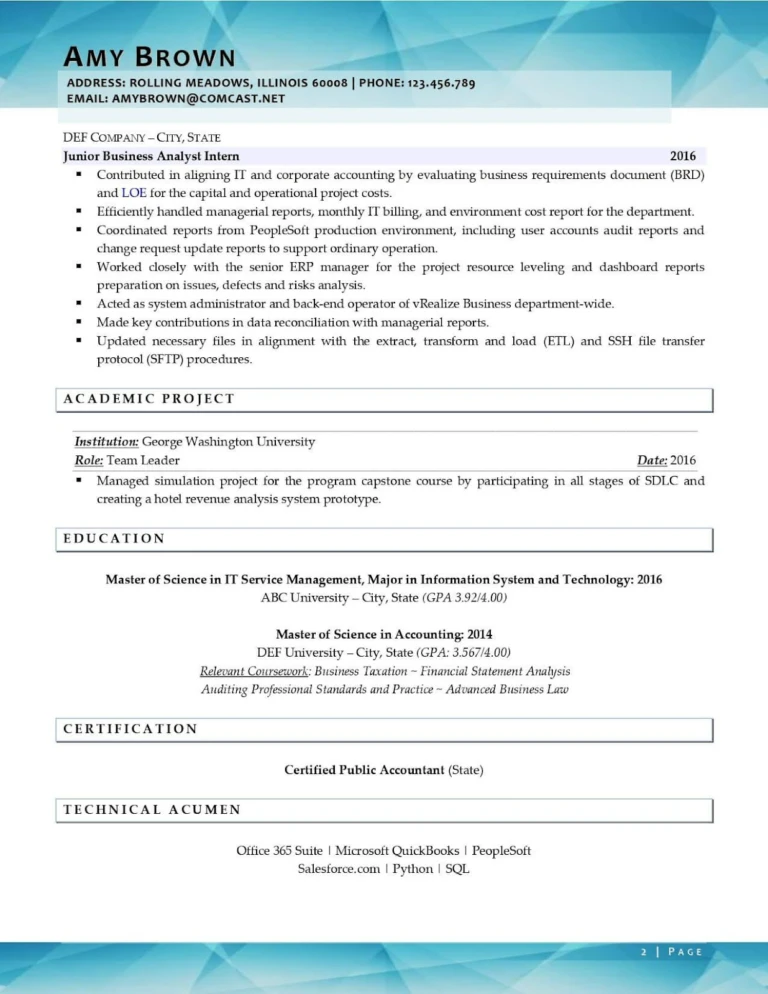In today’s highly competitive financial landscape, the role of a financial analyst has become increasingly vital to organizations of all sizes. As a result, there is a 100% potential for the demand for this position to expand significantly in the coming years. In fact, according to the Bureau of Labor Statistics, job opportunities for financial analysts are expected to expand by 9% between 2021 and 2031.
Pursuing this career also offers other appealing benefits. These include a highly competitive salary range that, according to Payscale, ranges from $64,000 to $86,000 per year, depending on experience and qualifications. So, if you’re considering becoming a financial analyst, there are plenty of excellent opportunities awaiting you.
Do you want to know how to write a resume and cover letter that will grab the interest of employers and land you that desired financial analyst position? In this post, we’ll look at the work of a financial analyst and give you an easy-to-follow guide on how to write an effective financial analyst resume, along with an example to help get you started. Continue reading to know more.
What is a Financial Analyst?
A financial analyst is a specialist who works in the finance sector and offers direction and counsel to people or organizations on matters including financial planning, risk administration, and investment making and management.
Financial analysts usually find employment in a variety of environments, such as investment banks, hedge funds, asset management organizations, and other financial institutions. They might have varied areas of expertise, such as financial planning, risk management, credit analysis, or equity research. And to effectively explain complicated financial information to clients or stakeholders, the position often requires strong analytical abilities, financial modeling knowledge, and great communication skills.
What are the Duties of a Financial Analyst?
While the specific responsibilities of a financial analyst may differ depending on the industry, company, or project, they are typically expected to perform the following:
- Analyze financial data and forecast the performance of the organization.
- Present financial results and reports to stakeholders and a board of directors.
- Plan the company’s budget, revenue, and expenses.
- Work closely with the accounting staff to ensure accurate financial accounts.
- Create creative solutions to improve the financial performance of the company.
- Assist with monthly and year-end accounting.
- Keep an eye on the company’s important financial metrics.
- Assist with due diligence and target discovery for business acquisitions.

How Do You Become a Financial Analyst?
Due to the fierce competition and continuously changing nature of the financial services sector, breaking into the field as a financial analyst can be challenging. However, if you’re serious about pursuing a career as a financial analyst, you can follow these effective ways to equip yourself with the necessary skills and properly prepare yourself for the position:
Earn a bachelor’s degree: Financial analyst positions normally require a bachelor’s degree in economics, finance, accounting, or other related fields. However, if individuals have good analytical skills, some employers appreciate other degrees, especially in certain areas.
Expert Tip:
Although a master’s degree is not always required, having one can also give you a competitive edge in the job market and provide you with more specialized knowledge in a particular area.
Obtain certifications: Depending on your career goals, you may want to consider obtaining certifications such as the Chartered Financial Analyst (CFA) designation, Certified Financial Planner (CFP) certification, or the FINRA Series 7 and Series 63 examinations. These credentials demonstrate your expertise in a particular area and can improve your job prospects.
Develop your knowledge and skills in the field: In addition to formal education and work experience, financial analysts need to have strong analytical, problem-solving, communication, and organizational skills. Develop these skills by taking relevant courses.
🔍 Think Your Resume’s Fine? Let’s Double-Check That
Even strong resumes can miss critical details—especially when it comes to passing Applicant Tracking Systems (ATS). Our specialists offer a free review to uncover gaps, improve formatting, and ensure your resume is ATS-ready and recruiter-friendly.
Acquire experience with financial modeling and analysis tools: As a financial analyst, it’s essential to gain hands-on experience in using financial modeling and analysis tools. So, try to attend training on Excel, Bloomberg, and financial databases such as Capital IQ or FactSet as much as possible.
Gain practical experience: Many financial analyst positions require 1-2 years of work experience in a related field, such as accounting, banking, or finance. So, if possible, try to participate in internships and other programs to gain experience in the field.
What to Include in Your Financial Analyst Resume
To increase your chances of success in this sector, use the following sections to incorporate the most relevant information and experience in your financial analyst resume:
Contact Information
Put your full name, address, phone number, and email at the top of the page of your financial analyst resume to make it stand out. To further strengthen your application and promote your professional brand, you may also provide links to your LinkedIn page, social network accounts, and online portfolio.
Specific Job Target
Next to your contact information, include a “career tag.” This will let your potential employers know what type of job you are seeking, making it easier for them to match your skills and experience with available positions.
Qualifications Profile
Crafting an attention-grabbing resume summary or outstanding qualifications profile for the hiring manager, is the next thing you should focus on. In 3 to 5 powerful words, highlight your pertinent experience, abilities, and accomplishments while articulating your suitability for the role. This summary, when done right, can thus improve your chances of getting an interview.
Expert Tip:
Avoid using bland resume objective statements, and instead opt for compelling titles and headlines that showcase your unique skills and accomplishments.
Areas of Expertise
When crafting your financial analyst resume, it’s crucial to incorporate the necessary finance skills sought after by potential employers. Be sure to carefully review the job posting’s requirements and emphasize the relevant job skills that align with your experience in this section.
Related Article:
Professional Experience
In writing your financial analyst resume, it’s important to highlight your past work experience and provide specific details about your responsibilities, accomplishments, and measurable outcomes. Emphasizing your previous achievements can help to illustrate how you can bring value to your new role and organization. So be sure to use concrete figures and percentages to highlight your successes and demonstrate your ability to effectively manage tasks and projects.

Education
One of the most crucial components of your financial analyst resume, aside from your experience, is your educational background. So, make sure to detail your education on your resume. List your degrees along with other academic achievements in reverse chronological order. You can also include any coursework or academic projects that are pertinent to your current position as a financial analyst to lend more credence to your qualifications.
Professional Development
Highlighting your training experience, certifications, and licenses on your financial analyst resume can impress hiring managers and showcase your relevancy and value to the role. So, consider listing these credentials in your resume in reverse-chronological order, similar to the education section.
Optional Section to Include on Your Financial Analyst Resume
Include additional sections for your technical skills, professional affiliations, and volunteer experience to sell your unique strengths and qualifications as a finance analyst. Also, by including these optional but valuable pieces of information, you can demonstrate your versatility, expertise, and commitment to both personal and professional development.
How to Write Your Financial Analyst Resume
Below are some useful resume writing tips that can make your resume stand out from the competitions. By following these resume trends and writing tips, you can increase your chances of landing your dream finance job and kickstarting your career in this exciting and dynamic field.
1. Apply a layout and design that is simple but appealing.
While creativity can be an asset in many fields, it’s still best to stick to a traditional, straightforward format that clearly puts more premium on your experience and skills. You are more likely to pass the initial screening process and secure an interview if you write a clear, succinct resume that persuasively highlights your qualifications. So, stay away from employing highly imaginative layouts or styles that can distract the recruiter away from the content of your resume and reduce your chances of being selected for further consideration.
2. Select the ideal format for your resume.
It’s important to choose a resume format that best showcases your abilities, knowledge, and experience. If you have a lot of experience in your field, the chronological format can be a powerful way to show off your development. However, other styles, such as functional or combination, may better shed light on your credentials and abilities if you’re changing careers or have a varied set of capabilities.
3. Highlight your industry skills and expertise.
To outshine the competition, you need to make your exceptional skills and abilities in your financial analyst resume stand out. Emphasize your expertise in financial analysis, accounting, budgeting, financial reporting, communication, and research. Doing so will help you demonstrate that you are the most qualified candidate for the job.
4. Include relevant keywords in your resume.
Employers rely on resume keywords to efficiently assess your suitability for a role. To maximize your chances of success, it’s crucial to include these industry-specific keywords not only in the skills section, but also throughout your financial analyst resume. In addition, utilizing these keywords can help you navigate the applicant tracking systems (ATS) and advance in the hiring process.
5. Make your accomplishments more compelling by providing specific data and examples.
Instead of stating your duties, it is strongly advised to use numbers and examples to highlight your professional achievements. By doing so, you can differentiate yourself from other job applicants and increase the impact of your resume. Concrete evidence of your achievements can make your application more memorable and impressive to potential employers.
6. Proofread resume for better accuracy.
After finishing your financial analyst resume, it’s crucial to thoroughly review it to ensure its accuracy and polish. Take some time to read through it to spot and correct any errors in grammar, spelling, and punctuation. Remember, a well-crafted, error-free resume can significantly improve your chances of securing job interviews and advancing your career.
Expert Tip:
Once you have thoroughly proofread your document, you may consider taking advantage of a free online resume review service. These reviews can offer insightful criticism of your resume’s structure, content, and general presentation, which may help you make the required adjustments and differentiate yourself from other job candidates.
Financial Analyst Resume Example
Are you seeking ideas to help you write a polished resume for a financial analyst that will stand out to employers? Look no further! Below is an example of a well-written application tool crafted by our expert writer that you can use as a guide to create your own financial analyst resume:


Note: For more samples, browse through our finance resume examples.
Let Our Financial Analyst Resume Writers Ensure Your Successful Job Search
Are you looking to become a financial analyst but struggling to create a resume that stands out in the competitive financial services industry? We are here to help! Resume Professional Writers offers the most affordable yet quality resume writing services that can help you transition to a new role within the finance industry. Our team of skilled resume writers specializes in highlighting your strengths, qualifications, and accomplishments in the most persuasive manner that can surely increase your chances of landing that financial analyst post.
What are you waiting for? Contact us today and don’t miss the opportunity to land your dream job in finance!








